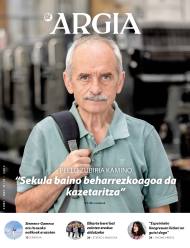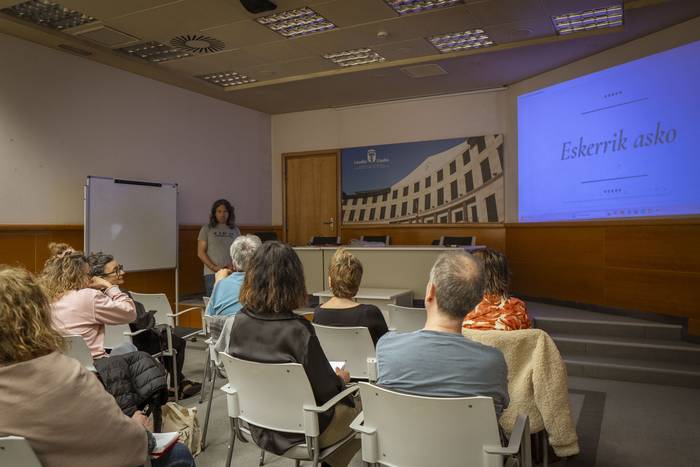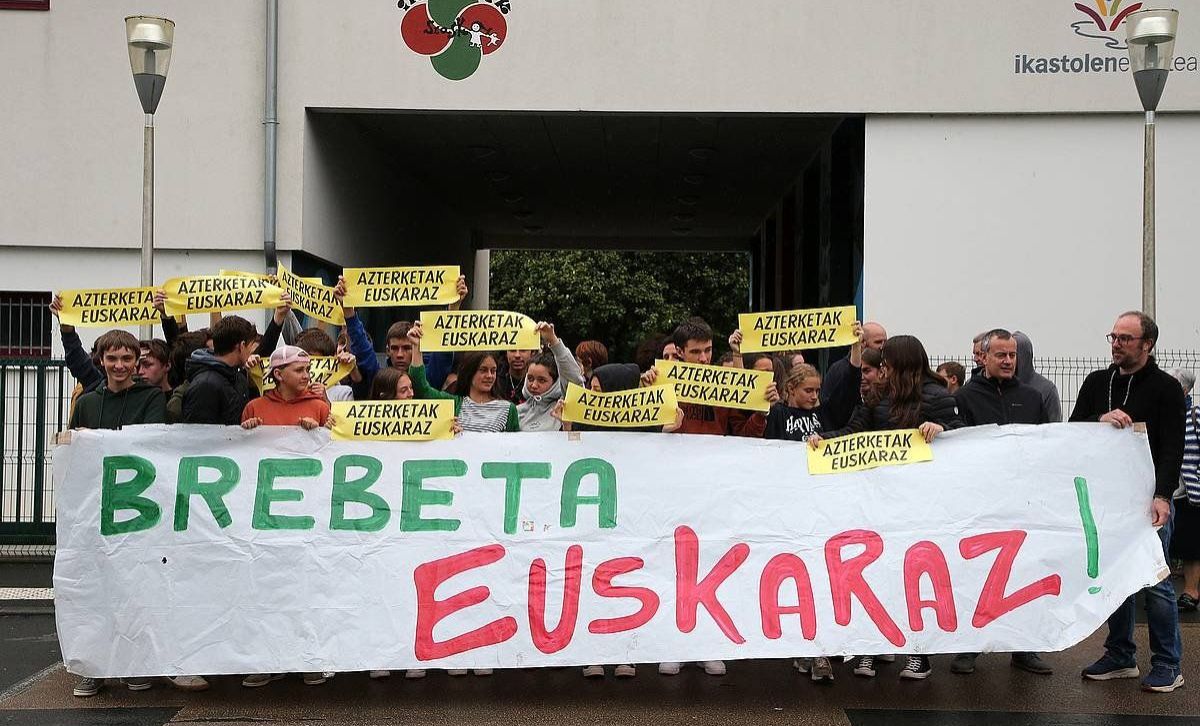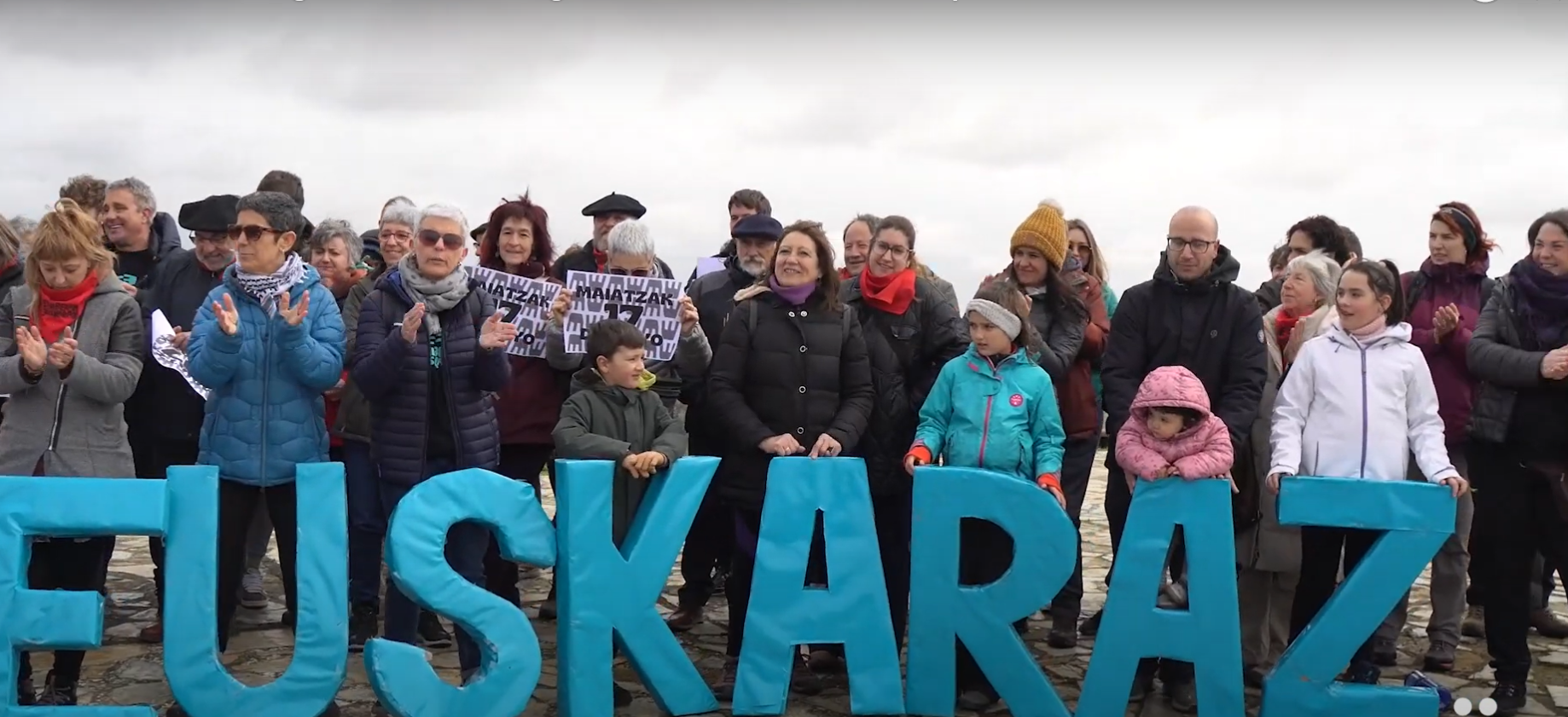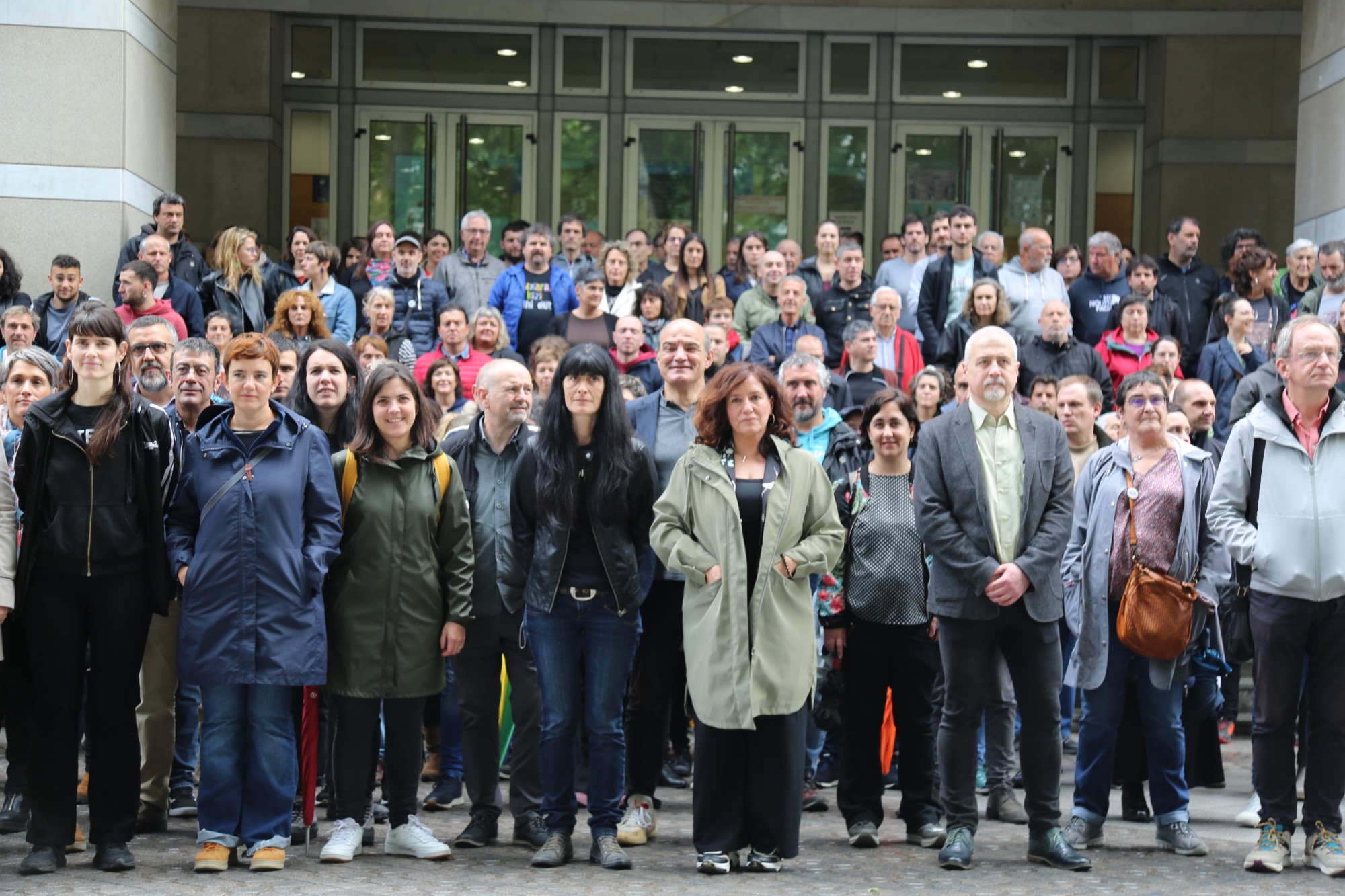“No matter how we use it, we need to communicate in Basque”
- September 19 was an historic day in the Spanish Congress, since the Democratic Courts were restored 45 years ago, because for the first time, in addition to Spanish, we were able to hear other languages of the State. Mertxe Aizpurua was the first person to speak Basque. When he began and pronounced the phrase "In Basque Country we want to live in Basque", those who put the headset heard a female voice in Spanish. Jaione Arrangi (Zaldibar, 1976) worked as an interpreter. We have talked about that day, about your work, your word, your language, your politics and your bridges.
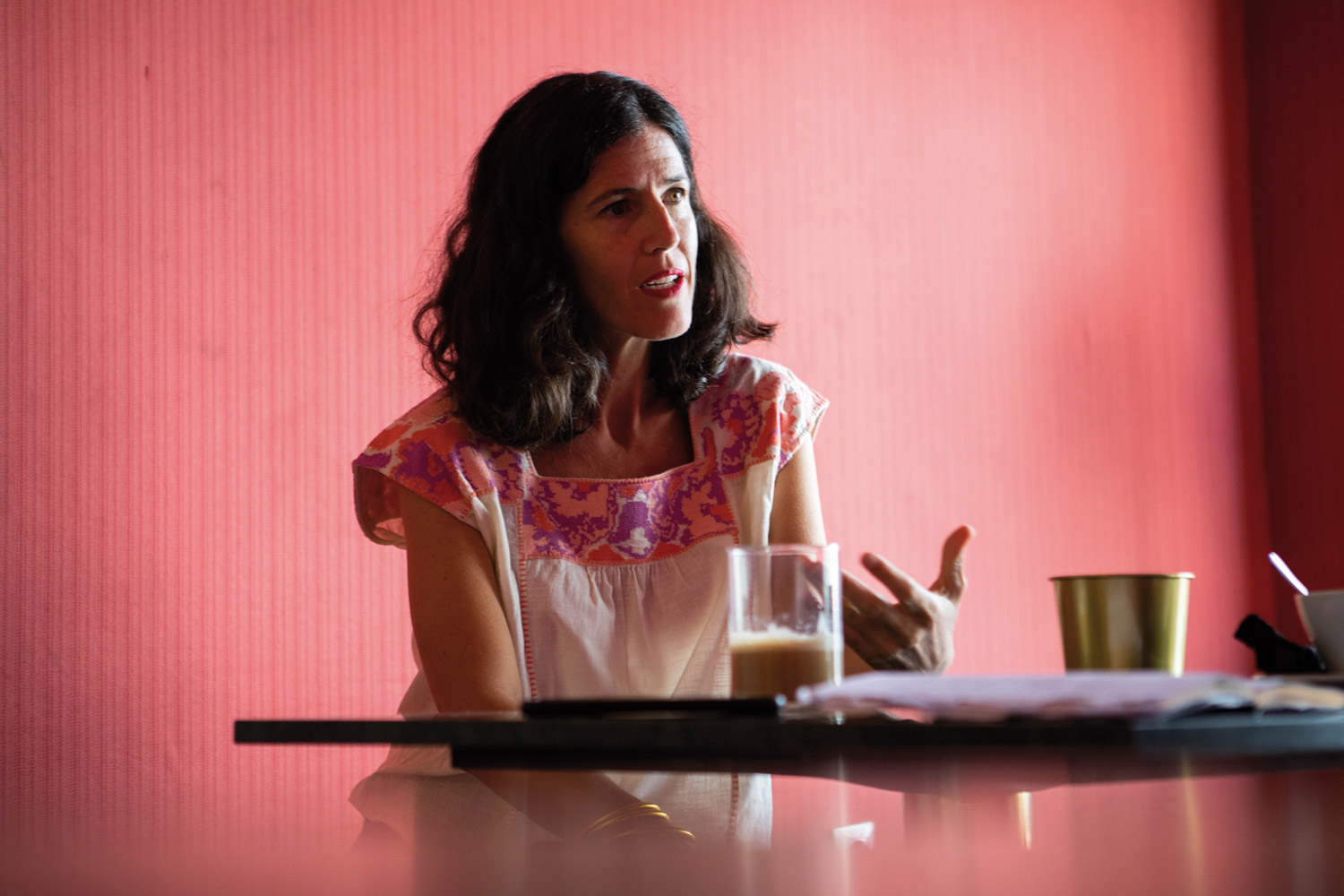
Once a acquaintance told me that we all have a linguistic biography. What's yours?
I'm from Zaldibar. The parents, Zaldibar's mother and Durangus father. My father is not Basque, I had my grandfather of Lemoa and Arratia, but the transmission was interrupted there. At home we were doing Euskera, my father was trying, but immediately I saw that his level of Euskera was not very good, and then I started with my father in Spanish and my mother in Euskera, but in the Basque environment. The perspective that gave me the time, that my father did me in Spanish, gave me a taste also with Spanish. I mean, I liked the two languages and I liked walking in the two. And language is a changing biography, right? Now a cycle is closed because my partner is Madrid, but he has been Euskaldunized, and it is like he was in my house (with my mother in Basque and my father in Spanish), but in a much more Castilian environment. I'm a little worried about transmission.
Now, on the occasion of parliamentary arithmetic, we have been able to hear in Basque in Congress. You worked as an interpreter that first day. What day was it? It was a very
exciting day. I had two txapelas that day, the Basque and the interpreter, and I did my work excited. However, it seems to be very recent, but this, the use of several languages in an institutional place, has been done and is done, not only here, but also in other countries, is absolutely normal.
[Congress] Today, in general, in all languages, there are few good speakers.
We were also nervous, to see how it was going to come out, and the fact that the media is so high doesn't make it easier for you to work. To all of this I added that for me it was the first time I did a remote interpretation, because we were not in Madrid, we were each talking about his house. I was close, I was in Bilbao. That remoteness is a change. Before it was unthinkable, the interpreters had to be there. I may prefer to be there. Especially because the work of interpreter is group work. You seem to be alone there, but we work in groups, two to three. That isolation doesn't convince me much.
What's
going on in Congress is being very controversial, right? Among others, the utility argument is cited. We all know in Spanish, why interpreters, headphones and other "superfluous expenses"?
These arguments make no sense. In the European Union every day we see multilingualism, although they have a common language, that is, even if most of them know English. Those people would be asked. Would you then agree that three working languages, English, French and German, should be established in the European Union? Surely those who oppose the use of several languages in Congress would say no: “No, no, we have to keep our language.” This argument is ideological and easily blurred by the praxis of other organizations.
There is a question of not understanding language rights. That is, not understanding that language rights are human rights. On the other hand, there is also what Mertxe Aizpurua said in Congress: one step is to formalize in Congress, in addition to Spanish, other languages, but let us not forget that in Euskal Herria linguistic rights are not guaranteed in many places.
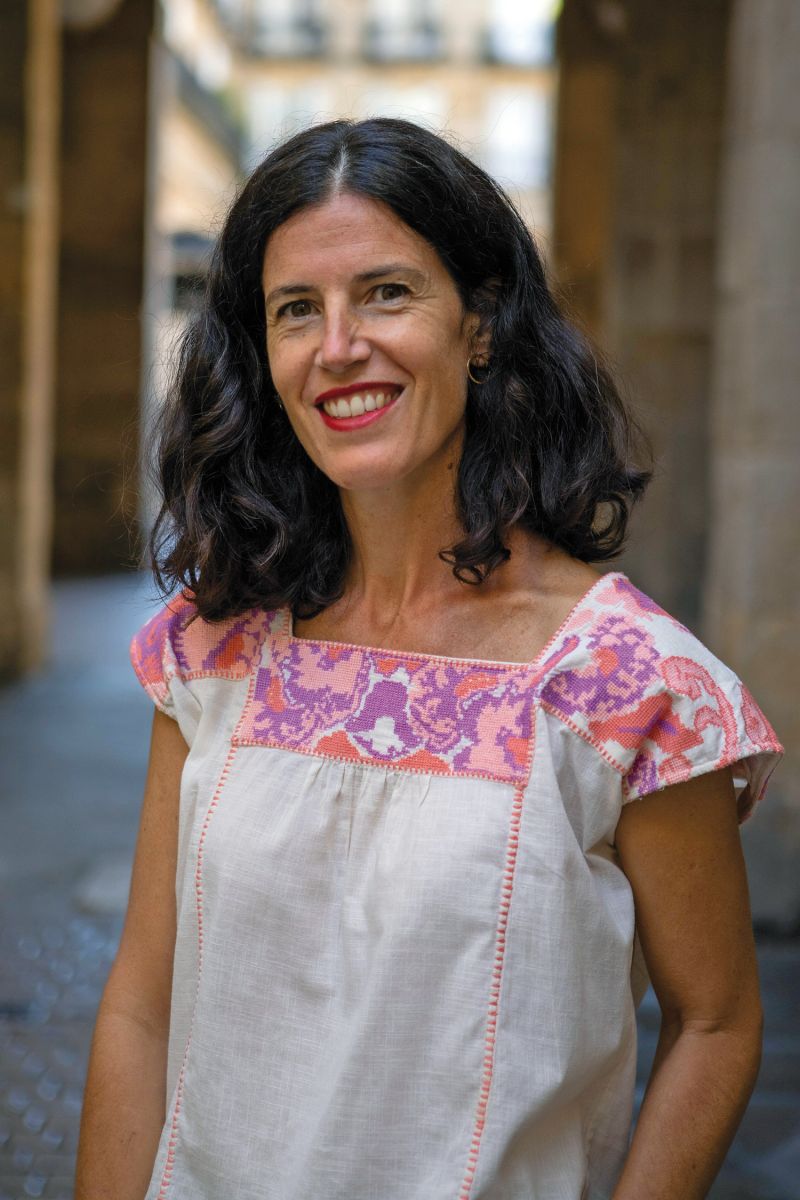
It talks about Europe. Now it seems that there could also be a new possibility of officialdom, but in reality, at certain times, since 2005 there is a right to do so in Basque, right?
Yes, there are options, and perhaps it is not a well-known issue. In 2005 there was an administrative agreement in which it was agreed that the Committee of the Regions could also use the official languages of the States. Representatives of the Basque Autonomous Community come to this Commission and interpreters are always asked for in Basque, but they have little time and not much is heard. However, I would say that they are trying to speak in Basque.
Are these permits used to speak in Basque to do so throughout Congress, in Parliament, in Europe? Or is Euskera used only symbolically?
According to the speaker, this symbolic use also occurs. For us, work is easier if you keep the same language throughout your speech. For example, as Senper did, saying something, then translating… that is what many speakers do. I don't know if they do it because of mistrust or why, but they make it difficult for us to work.
On the other hand, we must also look at our diglosic situation. There are people who do not have a high level of Euskera or a possibility to speak it naturally and are not prepared, sometimes people do not dare. However, it is not only a matter of minority languages, English also has its part, because everyone speaks English, but what kind of English? Sometimes our job is not to interpret, but to decode.
And does the Basque country have peculiarities in interpreting?
To capture a unit of meaning in Basque you must listen a lot. I mean, you can start following a sentence by following exactly where it's going, not knowing what it means, and warn yourself that you've lost the information when you start making sense of the phrase. Our work is primarily the interpretation of the senses. People ask: What do you do when you don't know a word? The context will tell us. The problem is not that, the problem is sense. I remember what a veteran interpreter once said to me: "You don't ask me, I'm not a translator." It is not in words, but in meaning and purpose.
Everyone speaks English, but what kind of English? Sometimes it's decoding our trade.
How do the Basques speak before the lectern? Are they good
speakers?Today, in general, there are few good speakers in all languages. To give you an example, I liked what Mertxe Aizpurua did. Joseba Agirretxe of the PNV, or even a Bingen Zupiria… there are good speakers coming from the press because they have that sense of communication. But in general it's difficult. There you see that in school today, orality is not working. And it's not just that you don't work, you're not prepared to express yourself. I've also been preparing interpreters and people are afraid to speak in public, it's fear related to something very profound. It is a pity, because speaking well is not only useful to speak in parliament, but it also makes our day easier to saya.Por another party, many Basque speakers think it is not high and they try to change the register, but there is no need,
no problems to understand it… but, well, the situation of the language leads us to ello.Es a profession that requires a high level of concentration, but also speed.
Yes, society advances and languages change with society. I always say: it's a job that starts every day, because every day there's a new theme. Continuing education is essential to us. I mean, languages are alive and you have to know what's going on in society: What is the debate? And from many points of view. For example, the issue of gender, or the issue of gender nonbinary, because it is a very interesting issue, because you can have your personal position, but watch out who you are interpreting, because you may not be able to use any form, or if you use a certain language, you are uploading the original.
You must know very well who is involved in the communicative action and what are the power relations in it. It is not the same to work as an interpreter at a seminar on Judith Butler as in the Israeli-Palestinian conflict. In both cases, for different reasons, you have to look at what you can say, what not, what terms you have to use. And you don't have to go that far: who gets in the mouth, how do you translate "Euskal Herria"? All this depends on work. Pre-preparation is high.
It was a very exciting day. That day I had two txapelas, the one for the interpreter and the one for the Basque.
What do you like most about your trade?
Yes, you're dealing with very different issues, with very different people, and it's a way of taking the pulse into the world. And you see the possibility of allowing communication. It's very nice to see you allowed communication. I like that, as a bridge.
Finally, in an interview he addressed translators and interpreters: "The important thing is not only knowledge of the foreign language, but also knowledge of the language itself. My recommendation is to work and love one's own language."
Yes, because you have to walk fast in your language. We do not have a dictionary available, we have to have the words inside us in order to use them with great flexibility. We must own a broad vocabulary in our language and fast in the formation of linguistic structures sticas.Por elsewhere, as a speaker, what we have to do in minority languages is to keep it in use and use it in all areas, and it is indifferent how we use it, what we need is to communicate in that language and normalise
its use. As an example, we have to teach people that ours is as useful as any other language.
Gora Aiaraldeko Jai Euskaldunak dinamika jarri du martxan aurten ere Aiaraldeko Euskalgintzaren Kontseiluak, Udal eta elkarteekin elkarlanean. Jaien testuinguruan euskararen presentzia eta erabilera sustatzea dute helburu. Iaz abiatutako bidetik jarraitu nahi dute aurten ere,... [+]
Antton Kurutxarri, Euskararen Erakunde Publikoko presidente ordearen hitzetan, Jean Marc Huart Bordeleko Akademiako errektore berriak euskararen gaia "ondo menderatzen du"
You may not know who Donald Berwick is, or why I mention him in the title of the article. The same is true, it is evident, for most of those who are participating in the current Health Pact. They don’t know what Berwick’s Triple Objective is, much less the Quadruple... [+]
Is it important to use a language correctly? To what extent is it so necessary to master grammar or to have a broad vocabulary? I’ve always heard the importance of language, but after thinking about it, I came to a conclusion. Thinking often involves this; reaching some... [+]
Adolescents and young people, throughout their academic career, will receive guidance on everything and the profession for studies that will help them more than once. They should be offered guidance, as they are often full of doubts whenever they need to make important... [+]
Maiatzaren 17an Erriberako lehenengo Euskararen Eguna eginen da Arguedasen, sortu berri den eta eskualdeko hamaika elkarte eta eragile biltzen dituen Erriberan Euskaraz sareak antolatuta
Ansorena´tar Joseba Eneko.
Edonori orto zer den galdetuz gero, goizaldea erantzungo, D´Artagnanen mosketero laguna edo ipurtzuloa, agian. Baina orto- aurrizkiak zuzen adierazten du eta maiz erabiltzen dugu: ortodoxia, ortopedia, ortodontzia... Orduan (datorrena... [+]
We have had to endure another attack on our language by the Department of Education of the Government of Navarre; we have been forced to make an anti-Basque change in the PAI program. In recent years, by law, new Model D schools have had to introduce the PAI program and have had... [+]
"Ask for your turn and we'll join you," the willing and cheerful announcer who speaks from the studios tells the young correspondent who walks through the streets of Bilbao. The presenter immediately addressed the audience. "In the meantime, we are going to Pamplona..." They opened... [+]









